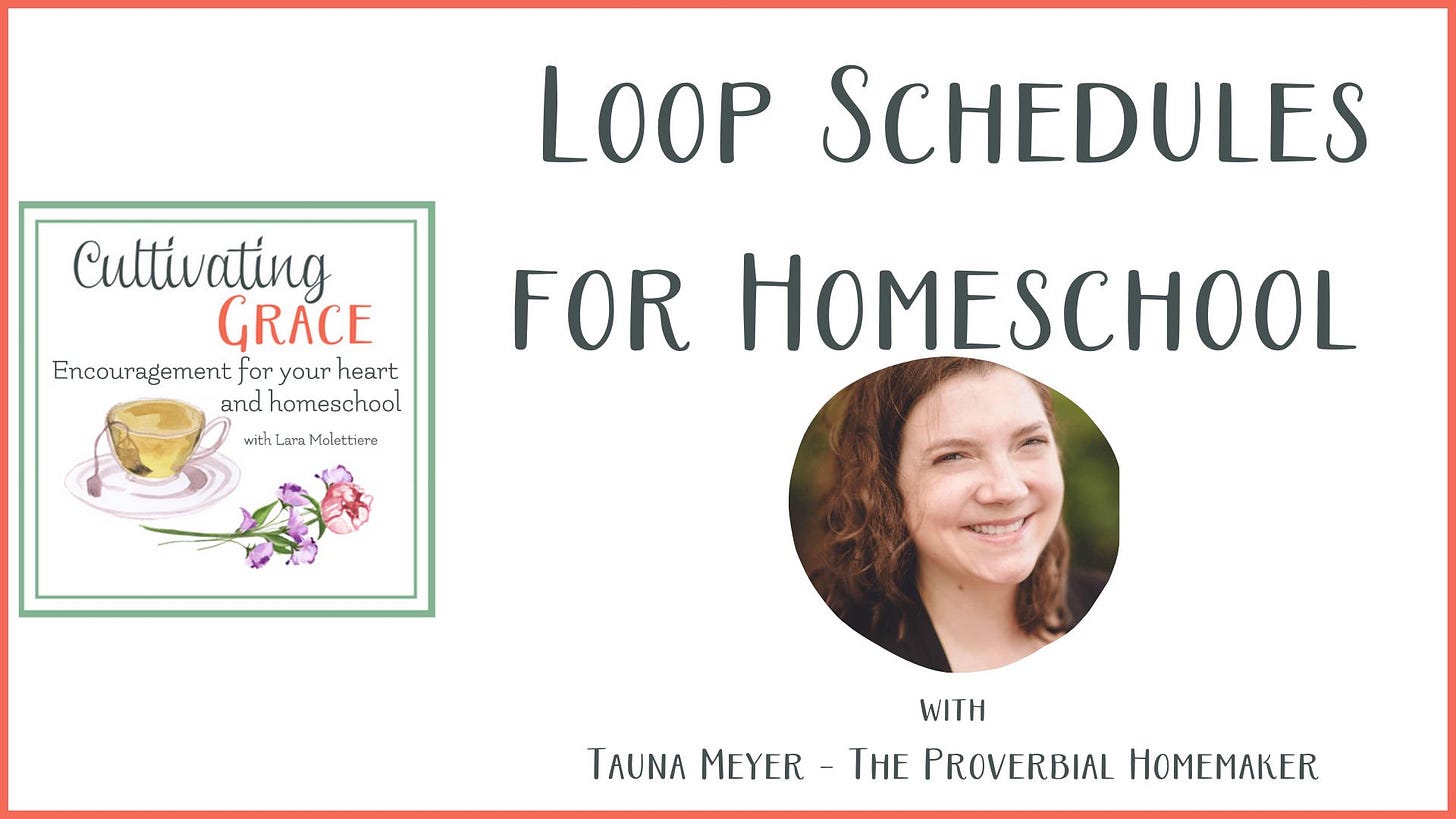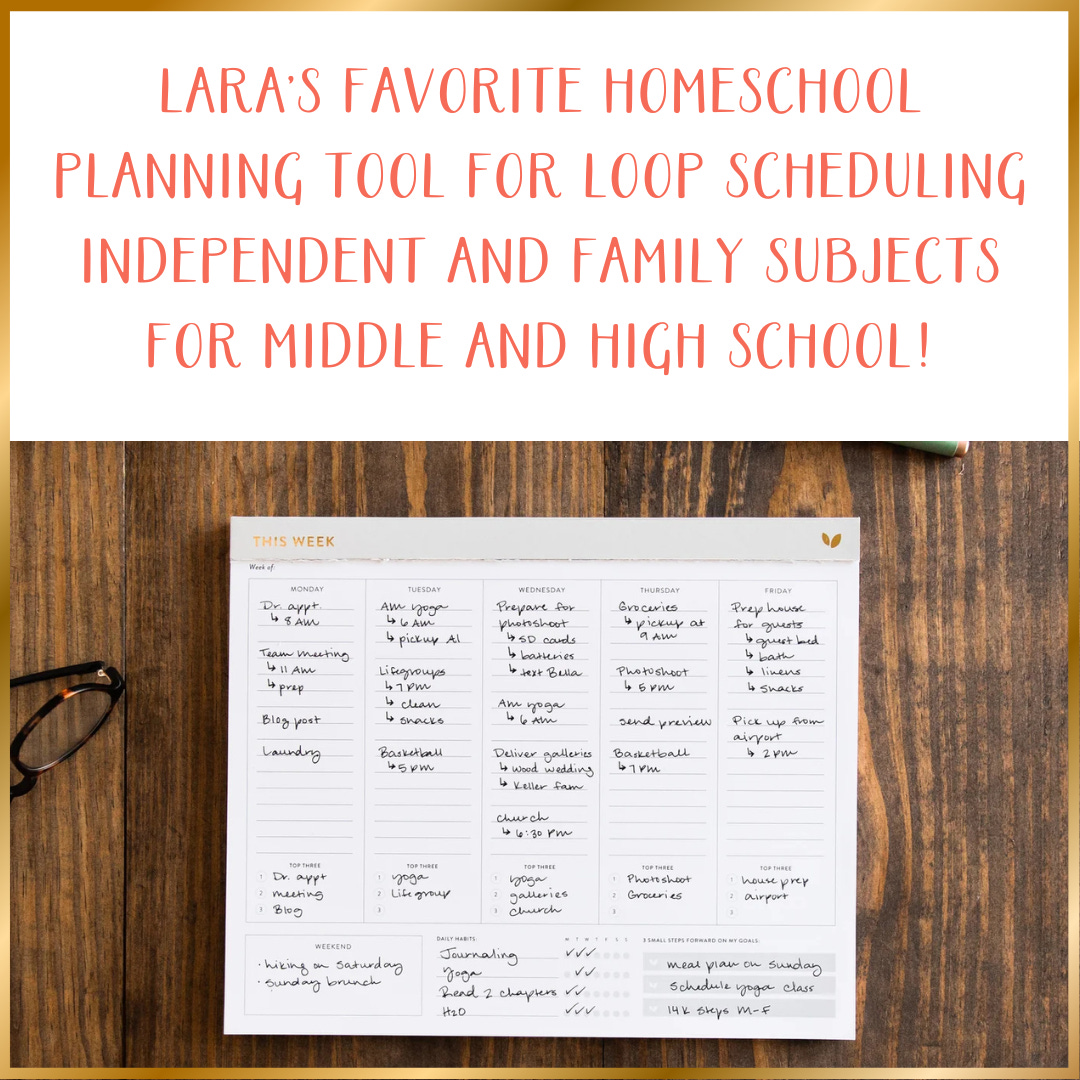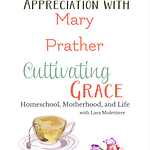Loop Scheduling with Proverbial Homemaker Tauna Meyer
Lara:
Welcome friends, today we are talking to our friend, Tauna from the Proverbial Homemaker, and I am going to let her tell us a little bit about herself and her family before we dive into the wonders of loop scheduling.
I am grateful to be of service and bring you quality homeschool and homemaking content. I receive compensation through subscribers, curriculum sales, and affiliate links. As an Amazon Associate I earn from qualifying purchases.
Tauna:
Awesome. Thank you so much for having me. So I am a homeschooling mom of six. We have been homeschooling from the beginning and Lord willing, we'll homeschool all the way through high school. And we live in the Pacific Northwest, which is normally beautiful, but right now it's covered in smoke, but it's starting to clear up from the wildfires. So we still love it here, and all the nature and so anyway, and I write @proverbialhomemaker.com, and provide resources for homemaking and homeschooling and family discipleship. And I'm really glad to be here to talk about loop scheduling cause that's one of my favorite topics.
Lara:
Awesome. So before we get too far into this, let's talk about what loop scheduling actually is, because I had never heard the term until I became a homeschooler, and I'm sure we've got lots of friends in the same boat.
Tauna:
Yeah. Loop scheduling is a pretty simple idea actually. It's a very simple idea that can be used in a lot of different ways. And basically loop scheduling just means you have a list of tasks or resources or subjects, and you rotate through them. And when you get to the bottom of that list, you go back to the top. That's basically what loop scheduling is, but there's a lot of different ways that you can use it. So for example, a lot of times, if you see homeschool schedules, you'll see things like, maybe do math every day, do Bible every day. And then on Monday and Wednesday and Friday, do history and on Tuesday and Thursday, do science or things like that. And it sort of a combination of block scheduling where you have certain blocks of days where you do certain subjects and things that you do every day.
So that's kind of a block scheduling or traditional schedule, and a loop schedule is different because basically you get to a time during your day where you're going to do work, you're going to do homeschool work, and you have your looping list, and you start at the top, and you do the first thing on the list, and then you check it off, and then you do the next thing. And so basically what happens is the next day will you start your work, and you do the next thing on the list? You just pick up where you left off. And then when do you get to the bottom, you start back at the top. So it's very simple, and like I said, you can rotate your subjects or resources or tasks. So it's very flexible. And, I know you guys do a lot of morning baskets, and we use your morning time resources. And we really like them. That is a kind of a loop scheduling in itself.
Lara:
Yes.
Tauna:
And in fact, I remember talking to a mom who was doing loop scheduling, and she couldn't quite wrap her mind around it. And I said, well, I knew she did morning baskets. And she actually had a physical basket with books, stacked all pretty and beautiful on her table, and which nothing is ever pretty and beautiful on my table. So I was impressed. But anyway, so she would start in the morning, and she would just read a little bit, and flip through the books. And then when she got to the end, she would go back to the beginning. I'm like, that is a loop schedule. You're basically doing that except on paper instead of through actual physical books. So that's basically what loop scheduling is.
Lara:
That's awesome. And so you can actually apply this. It's something I've been working on as a mom, I'm trying to apply loop scheduling to my cleaning schedule.
Tauna:
Yes.
Lara:
And it helps keep everything sort of less overwhelming because, like one day we do bathrooms, and one day we focus on really scrubbing the kitchen good, and one day we make sure the floors are really good and clean, and one day is for laundry, and we just cycle through those days because sometimes as homeschoolers things happen, and the days go askew, and we don't maybe necessarily get to the kitchen, but we just go to the kitchen the next day. So we don't get too far behind. So loop scheduling, I think, is really beneficial for multiple things.
Tauna:
Mm-hmm(affirmative).
Lara:
Now, how did you become a loop scheduler?
Tauna:
So in my first few years of homeschooling, I really struggled because, well, you guys probably know this, you go onto Pinterest or you go onto blogs where they have everything together and it's all organized and amazing. And you try to do that, right? Because that's what you're supposed to do when you homeschool. And for someone like me who is organizationally and domestically challenged, it just, it didn't work. It was horrible. It was like detailed schedules and lesson plans just fell apart for me. I tried block scheduling and that bombed too. And I felt really discouraged. I'm like, can I do this? I mean, we weren't going to public school, wasn't an option for us, but I still felt like, okay, clearly something's wrong. I need to do differently. So I checked everything and I started from the ground up.
Tauna:
I started with our family routines and rhythms and just started working on those and kind of getting a good thing going with that. I prayed for guidance on how to structure our homeschool. And that is what brought me to this rotating list. And at the time, I didn't know there was a term for it, but over time I found out that people called it loop scheduling. So I was like, Oh, and the more I researched, I found more ideas to kind of incorporate into what we were doing. And so I ended up implementing loop scheduling for my homeschooling and it was so successful that I ended up using it for homemaking. And like you're talking about, I use it for my homemaking, which is great because otherwise it's nothing we get cleaned. And, even my personal habits and work projects and everything I used to have scheduling for.
Tauna:
Because it just fits how I think. So nowadays we do, for years now, we've done a flexible four day routine in our homeschool. We have what we call daily dues. They're the things we do every day, bible memory work and now history, which is just something we started last year doing every day. And then, there's a couple more things, but that's the basic three. And then everything else is on loop schedules. So we have our morning time resources, we have nature study, we have read aloud rotations, all sorts of loop schedules that are worked into our system. And we just kind of tweak those things as we go, as seasons change or as our needs change or as our kids get older.
Tauna:
And now my older two kids, I have my older, well, I guess three kids now, my older three are seventh grade, fourth grade, wait seventh grade, fifth grade and third grade. I just gave myself a test and failed. So anyway, my older three kids for a couple of years now have had their own checklist that are loop schedules. So they have, when it gets to time to doing their independent work, they have their daily dues they have to do every day and then they have their looping schedules. So it's been working really well for us for several years.
Lara:
That's wonderful. Now, how do you actually keep track of what you're doing? Do you have a written list where you just mark things off as you get them done?
Tauna:
Well, we have, I'm not terribly good at paper. So what I do is I have my loop schedule for myself. This is what we're going to do every day, this is what we're going to rotate through. And I post it, right next to me because we do most of our seat work at the dining table. So I just post it on the wall next to the dining table where I sit. So that I can just glance over and know what's next on our loop schedule.
Tauna:
And then my older three kids they have, what do you call them where you, clip paper to it? Clipboards. So they have clipboards on the wall with their own loop schedule and they're laminated. So I just change them as needed and they just check them off and go through their loops. So they know exactly what they need to do and they can do it all independently and just ask me when they have questions.
And so by the end of the week, we have kind of an idea of what we've accomplished and I don't do detail. I don't do lesson plans or anything because that's just too much work. So instead I just record what we actually did and I get to record all these beautiful things. I have no empty checkboxes to look at and feel depressed about. I say, wow, we did so much learning this week. So it works well for us.
Lara:
That's awesome. And I think that I love having things laminated. We have some things that are laminated and we have some things we actually keep inside of menus.
Tauna:
Oh, you have a good idea.
Lara:
Well, especially like our morning time resources, because that allows everything to, we just flip through it and if we're using like the tea time recipes, it's got kind of a protective cover over it.
Tauna:
Yeah.
Lara:
But we liked the little, the China, they're called China markers. They're not markers at all. They're like little pencils that I found that erased better off of the laminated sheets than dry erase markers.
Tauna:
I have to look that up. Because right now we use wet erase and you know, that can get messy when mama has to go wipe everything off. And so I'll have to look that up.
Lara:
I think there's, a lot of really good things that come from letting your kids have that kind of independence too, with the looping and letting them be responsible for their own schedule to a certain point. And I also like reverse planning. Our morning time stuff is planned, but I told people this before, we don't always get through all of it. We really enjoy going back at the end of the week and filling in our stars for their narrations.
And then I'll just write out what we did. And to me that was, it was freeing, not having all those boxes that I felt like I needed to check. And I've noticed a lot more homeschoolers, especially the later they are into their homeschooling journey, seem to do what I call the reverse planning as opposed to the filling out the check boxes. So yeah, I think that's a good hint for our new friends that are just starting to homeschool now.
So you are the loop schedule queen! What are your top three tips? If you were going to tell someone what they needed to do to really just sort of get started with loop scheduling?
Tauna:
I think a really simple way to get started is to sit down and write down all the things you want your kids to do every day and all the things you want them to do eventually, but they don't have to do every day. That's really easy. Usually you're going to find, I think everybody does this, even veteran homeschoolers, you're going to find that you try to put too much into their day. Loop scheduling is a great way to handle that problem. We just came across this this year. I tried to pack too much into my seventh graders day and realized that. And so we're like, okay, no problem, we'll take things and move it to a loop schedule instead of the daily. And it was an easy change, but that's a really good way to get started.
Tauna:
Set up, just sit down, write down your dailies and your loops and just try it. Just try to do it and then tweak as necessary. I think sometimes people get discouraged loop scheduling when it doesn't work the first time, but it really is something you need to just sit down, write it all out and then just play with it and see how it goes. So you can use it. Like I said, to kind of adjust things, if you feel like you're trying to cram too much into their day. You can also... It's a really great way to incorporate all those things that you want to do, but you keep dropping the ball. Like art was our big one. We just never seem to get it done or even nature study. We had a really hard time for a long time getting nature study done.
Tauna:
But once we added it to our loop, now it's just something I know that we will make progress on and we won't fall behind. We just don't have, if the day or the week or even the month falls apart, we just pick back up where we left off. And then the other thing is for older kids, it's not just for elementary ages, for older kids for middle and high school loop scheduling is a great way to address electives, have their daily things, and then give them a looping list of the electives that they chose or that you chose for them, and have them work through it that way. So those are three ways you can start to get started with loop scheduling.
Lara:
That's awesome. Now you have some resources on your website for this too, right?
Tauna:
Yeah. So you can, if you go to proverbialhomemaker.com, you can find loop scheduling templates that are free, and you can find a video where I talk a lot about, I go into more detail about how I use loop scheduling for homemaking. And then I have a loop scheduling workshop, which is an online course that you can take that goes it more in depth because there's a lot you can do with loop scheduling. You can get into sub-looping and all this crazy fun stuff. And the thing I think I love about loop scheduling is I think it helps us to break out of that public school mindset, where we have to have everything in neat little boxes, and everything has to match our experiences that I was in a public school system growing up. And so I have that kind of mentality. So this was really helpful to break me out of that. So I can be creative with our schedule and our routines to fit our unique needs as a family.
Lara:
That's wonderful. And we will put those links into our show notes so everybody can get those really fast. Thank you so much for sharing with us about loop scheduling. We're going to close out with just a couple fun questions. So what are you reading currently for yourself, and what song do you have on repeat right now?
Tauna:
Okay. So right now I'm reading, Raising Them Up by Israel Wayne. So I'm slowly working through that. My reading time is on a loop schedule. I'm slow, but I'll get there eventually. And then the other one I just picked up is called 40 Favorite Hymns on the Christian Life by Leland Ryken. I think it's how you pronounce it. It's really interesting. It goes through different hymns, and treats them like poetry, and talks about their spiritual and their poetic significance. It's really interesting. I'm enjoying it a lot.
Lara:
That sounds awesome.
Tauna:
Yeah. Yeah. And it's short, which always makes me happy. And then for as far as the music, so every morning after our breakfast, I turn on this lesson countdown playlist, and it has about 20 minutes worth of songs that I get to pick, which is what I have on repeat every day because we listened to it every day. And by the time the list is over the kids have to be sitting back at the table, and have finished their morning chores and responsibilities and be ready for our group time. So on that list is what I put all the things I'm really into at the time. And right now the song that is just really setting the mood for me for a worshipful day is by MercyMe and it's called Messiah. And then I have a bunch in there right now from the Chris Rice hymn albums. They're really good. So yeah, those are what I'm really enjoying right now to start our day well.
Lara:
That's awesome. I think I've got like six different versions of His Eyes on the Sparrow that just loop. So what is one piece of advice that you would give to our new friends who find themselves suddenly and unexpectedly homeschooling?
Tauna:
Yeah, I have more than one piece of advice.
Lara:
That's okay. Lay it out there.
Tauna:
So I think I would say to just take one step at a time, don't worry about trying to figure everything out. I mean, we know that it's a firehose of information and that there's a learning curve. We all know that it takes homeschoolers a good two to three years to really find their groove in homeschooling. So give yourself and your children, heaps of grace. And, scripture says that God will give us everything we need for life and godliness. And I think the same is true for homeschooling. I truly believe, and I've experienced this in my life, and especially if we're prayerfully seeking the Lord's direction that He will provide you everything you need to raise, and educate your children well. So I think that the main thing we can do is just faithfully follow His leading, do what He's asking us to do, and trust him with the results. And he never fails us.
Lara:
Absolutely. I feel like I should just shout amen. I think we do kind of get lost in the whole wanting to be equipped from the very beginning, but I also think through homeschooling, He uses that to sanctify us as the parents. We are equipped as we go, and I think that's something else that's really important for our friends to remember. So thank you. That's wonderful advice. And thank you so much for joining us today. This has been such a fun chat.
Tauna:
Yeah. Thank you so much for having me. It was great.
Resources mentioned:
Store >> https://proverbialhomemakerstore.com
Loop scheduling workshop >> https://proverbialhomemakerstore.com/collections/homeschool-tips-planning/products/loop-scheduling-workshop
Free loop scheduling templates >> https://www.proverbialhomemaker.com/loop-scheduling-printables.html
General loop scheduling info with video >> https://www.proverbialhomemaker.com/loop-scheduling.html














